The Smar Art Type That Shows Syria in a Process or Time Line
With the enemy at the gates, Bashar al-Assad was dining out: Analysis
Despite rebel forces invading the Syrian upper-case letter of Damascus last calendar week, President Bashar al-Assad was putting on a show of business concern every bit usual by dining at a modest downtown restaurant
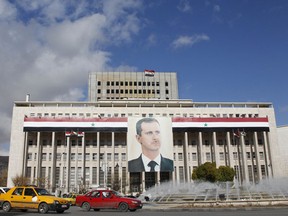
By Mariam Karouny

DAMASCUS — With the enemy at the gates, Bashar al-Assad was dining out.
The sound of gunfire and explosions carried to central Damascus as his troops clashed in the suburbs final Saturday with rebels who had seized towns almost the capital. Masked gunmen erected checkpoints on the city outskirts.
But Syria's 46-year-old president, outwardly unfazed, put on a show of business concern as usual for fellow patrons of the smart downtown restaurant where he spent the weekend evening.
"He hasn't inverse his lifestyle," said a politician from neighboring Lebanese republic, a regular company to Syria, who has met Assad several times since the Syrian uprising began concluding March.
"He spent the evening at a Damascus restaurant," he added, speaking privately to Reuters near the president's movements on January 28, when the appearance of forces flying flags of the Gratuitous Syrian Army at the very edge of the capital had some, excitable, observers reckoning Assad'due south life expectancy in just weeks.
[np-related]
Memories of the tardily Muammar Gaddafi were quick to surface.
However there was more to his project of insouciance than the blowing of madness or despair. Others, too, take described to Reuters a Syrian head of state fully abreast of events on the basis — non the mere puppet of hardliners that some have portrayed — "relaxed and phlegmatic," and adamant to see off the claiming, offering some reforms, strictly on his own terms.
While few rate his long-term prospects highly, all is not lost, at least for now. Assad's troops swiftly drove dorsum the more lightly armed rebels from the outskirts of Damascus and many foresee a long struggle nonetheless for a country, at the heart of the Middle Due east, that is trapped in a "balance of weakness."
Pockets of territory are in open revolt, the economy is choked by sanctions and young man Arab leaders have joined the West in demanding he quit. Still Assad retains considerable strengths: he has military reserves; allies that include Iran and Russian federation; grudging consent from millions agape of Iraq- or Lebanese republic-style anarchy; and he can count on die-hard back up within his Alawite religious minority, who fear a sectarian bloodbath if he falls.
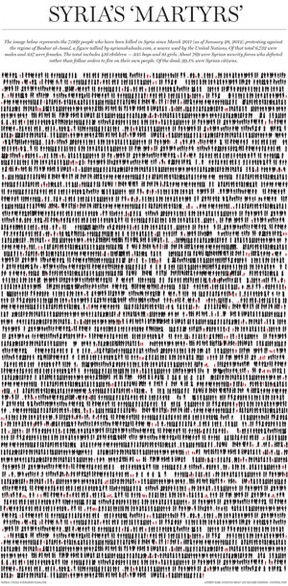
Defiance
Since people in the city of Deraa offset took to the streets virtually a year ago, inspired by Arab Jump risings elsewhere to demand freedoms, and were met with the ferocity that is the mark of four decades of dominion past Assad and his father, Syria has been near airtight to reporters from the outside world.
With the Arab League pressing for openness, Syrian officials have now given journalists limited access. Reporting last week, under surveillance, from Damascus, Deraa and the rebellious city of Homs, Reuters nonetheless found Syrians willing to evade, or defy, hole-and-corner police minders and to condemn the Assad authorities.
There was a climate of fright and despair, equally businesses suffer and people talk of mysterious disappearances, blamed on shadowy forces fighting both for and against the status quo.
An outwardly diffident ophthalmologist with a London-born wife, who was thrust to the fore but by the car crash that killed his elderberry blood brother, Assad has promised reforms to the Baathist one-party state developed over thirty years by his father Hafez. Simply he has insisted strictly on his ain terms and rejects the demand final month of the Arab League that he step bated.
"No, no, no. Never," his Lebanese associate said. "He will not resign fifty-fifty if the war lasts twenty years." Assad, he added, was fully engaged with "events on the ground."
A Western diplomat quoted another contempo company to the presidential palace as finding him "relaxed and phlegmatic", busy on his iPad, asking nearly the prospects for an Israeli strike against Iran and patently confident he could outlast his strange critics, simply as his father did for 30 years.
Only unlike the elder Assad, who crushed an armed Islamist uprising in the city of Hama thirty years agone this calendar week, killing many thousands, Bashar faces opponents who are entrenched across the country and hardened by a military crackdown on protests.
CHECKPOINTS
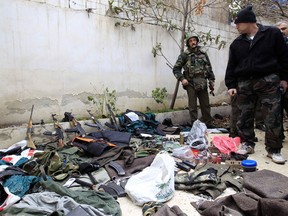
A visit past a group of foreign journalists to the eastern suburbs of Damascus last calendar week highlighted how much Assad's authority has eroded since the protests started, despite the shooting of thousands of demonstrators, mass arrests, torture and killings in custody and open warfare on mutinous army units.
A yr ago, it was unthinkable for Syrians to criticize their leader in public. But here now, simply 15 minutes' bulldoze from key Damascus, masked gunmen fighting to overthrow Assad were manning a checkpoint across the road and stopping cars.
The scene evoked another country – Iraq during the sectarian conflict which followed the U.S. invasion that toppled Saddam Hussein, or Lebanon during its ruinous 1975-90 civil war.
The day after the journalists' visit, Assad sent more than 2,000 soldiers to seize dorsum control from the rebels. The fighters were pushed dorsum, but their defiance was infectious.
"At that place is no force on earth that will make me take him as a president," said Hend, a housewife in her late 40s who spoke to Reuters in Barzeh, a district on the outskirts of the upper-case letter. Similar most of the people Reuters interviewed in Syria, she did not want to be identified for fearfulness of reprisal.
"He's not my president and never was," Hend added. "I just couldn't say so before."
Assad, appointed in a quasi-monarchical dynastic succession when his male parent died in 2000, rules a land which has been controlled past a network of at least xiii official security bodies.
Nigh Syrians can relate horror stories of the powerful intelligence services that have detained many tens of thousands of people. Memories of their suffering endure, perpetuated through the years of repression in a population that numbers 23 million, double what it was a generation agone in the late 1980s.
DERAA
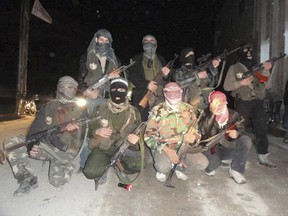
In Deraa, where the uprising first erupted, well-nigh the southern border with Jordan, Assad's forces have reasserted command militarily. But there is little testify they accept won over the hearts of the people.
Teenage girls leaving schoolhouse shouted "Freedom! Liberty!" equally journalists passed by. Many local people cast openly aroused looks at security men who were accompanying the reporters. Graffiti calling on Assad to go was still visible, despite obvious attempts to paint over it.
The security detail in manifestly clothes appeared uncomfortable escorting visitors upwards to the Omari mosque, focal point of the Deraa revolt, and most hung back and watched from a distance.
The bulletin from Deraa seems clear: a armed services offensive tin silence people but information technology will not dampen their anger. Rather the opposite, in a boondocks where it was the arrest of schoolchildren who daubed slogans inspired by Egypt'south uprising that sparked defection.
"When the dust of boxing clears, the blood spilt on the streets will make information technology difficult for Assad to rule every bit he did before," said a Syrian opposition figure during a secret conversation with Reuters in Damascus.
"Those who are against him now will always be against him."
Another opposition activist said Assad, who he described as wary of triggering tougher international action against him or of giving likewise much power to his army commanders, had held back and then far from using the overwhelming strength at his disposal.
"The regime could terminate things off militarily," he said. "Simply it doesn't want to pay the political price.
"Eighty percent of the regular army is yet in the barracks. He doesn't want to give the army command greater powers."
E'er since the long-overlooked second son took on his late father's drapery, in that location has been persistent speculation most the remainder of power inside the secretive ruling family unit and its entourage and over whether Bashar had liberal leanings that were held in check by the likes of his feared younger blood brother Maher.
Yet, diplomats, officials and other observers generally concur that the president is today a force in his ain correct, committed to hanging on to power on his own terms.
HOMS
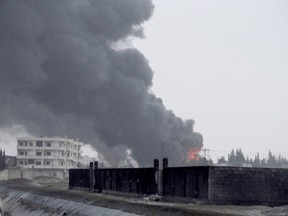
What that determination could mean in terms of continued disharmonize was visible in Homs. Information technology is ravaged by fighting between Assad'due south forces and rebels, equally well as clashes between majority Sunni Muslims and members of Assad's favored minority Alawites.
Loyalist soldiers and insubordinate gunmen manned sandbag barriers and checkpoints in rival ability bases. Streets were deserted and strewn with litter. Walls were marked by bullet holes.
Just a few streets from a government checkpoint, the rebels' green, white and black flag fluttered. A burnt-out armored vehicle sabbatum deserted, sandbags were scattered, signs of a violent battle in which the regular army seemed to have taken casualties.
Graffiti told a story of stand-off:
"Downwards with Assad" was written on one wall;
"God, Syrian arab republic and Bashar simply" declared a slogan reverse.
Journalists were taken past officials to visit a military hospital and a unmarried street before being told to leave after just 10 minutes – authorities could not ensure their safety. Two weeks before, a French announcer was killed in clashes in Homs.
Despite the close attention of regime minders, one young man dared to approach a Reuters reporter in full view of them: "Come with me," he whispered. "I'll evidence you what the security forces are doing to the urban center.
"They will come afterwards me later on," he added. "But I don't care. My life is nothing compared to the sacrifices of others."
DAMASCUS
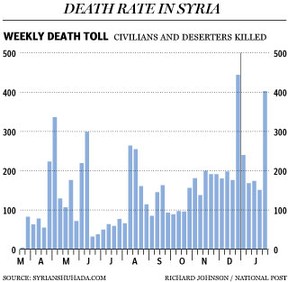
The defiance in Homs compares with the pervasive sense of foreboding in Damascus, where many people are but staying at home as much as possible, alarmed by stories of mysterious gunmen in the streets and unexplained disappearances.
Ane man, Nabil Haddad, spoke of one such incident he had heard of, which has evoked fears of the kind of ceremonious war that saw hundreds of thousands of Iraqi refugees flee across the border to Syrian arab republic over the past decade:
"My friend was stopped at a checkpoint outside Damascus," said Haddad, who is in his 30s and works in business. Speaking at a eating place in the capital's walled one-time city that is popular with the moderately well-off center classes, he went on:
"Men in noncombatant clothes told him his wife should go with them to the constabulary station, and he should get and get her papers from home.
"And then he did, and and then went to find her at the police station – only to exist told the police had non erected any checkpoint on that street and had never heard of his wife."
Throughout the capital, luxury and boutique hotels are virtually empty, while market traders say business has stale up.
The twelvemonth of unrest, coupled with Western sanctions on Syrian arab republic's crude oil exports, has plunged the economy into deep trouble, depriving Assad of $two billion in oil revenues and suffocating tourism, another vital source of income.
Merchandise has collapsed and businesses have closed or slowed operations every bit parts of the country have been shut down by the violence and basic functions of the state like taxation collection have basis to a halt in some areas.
The Syrian currency has fallen nearly 20 percent, to 58 pounds to the dollar. Economists say authorities are reluctant to keep spending billions of dollars to back up information technology.
Away from the banks, on the black marketplace, the fall has been steeper. The rate is now 70 per dollar. "Nosotros're worried that before long it will exist 100. This will exist a disaster for all of us," said one trader in the aboriginal Hamidiyeh marketplace, which a year ago bustled with tourists but now looks forlorn and deserted by customers.
Now, Iranian tourists, many of them on pilgrimages, are nigh the simply foreigners. Merchants say business has collapsed and Syrian shoppers are tense and gloomy.
"Everything we are getting is local now. Nosotros cannot discover imported appurtenances," said Fadwa Fahham, a Damascus housewife who complained nutrient prices have doubled and heating fuel is deficient.
In the aureate souq, shopkeepers say sales have fallen. Those who do come are not ownership for a special occasion, but to invest in something that may hold its value in a time of crisis.
"These days people are ownership to save for worse times alee," said one of the jewelers, who did non desire to be named.
"We are now similar Lebanon – nosotros are an arena for conflict," said Khaled, another resident of Damascus who spoke to Reuters privately. "There are political interests at play and every land has a say now in Syria'south crisis."
Assad'south supporters are confident their president will crush the defection, which they say is destroying the country. They speak of a silent majority upon which Assad can count.
His forces are yet overwhelmingly stronger than anything his opponents tin muster, Western and Arab powers have ruled out military intervention of the kind they deployed in Libya, on the fringe of the Arab world. And he enjoys support from Iran and Russia, a veto-wielding member of the U.N. Security Council.
Only Moscow could reconsider its political and armed forces ties with Syria, which date back to the Soviet era, if it judges that Assad'south position is untenable. And even his sympathizers in the region wait Syria to slide deeper into conflict.
"For certain, Syrian arab republic is heading for civil state of war, sectarian state of war – if information technology hasn't already broken out," said the Lebanese pol who is broadly supportive of Assad's dominion.
"The Alawites see it as a battle for survival."
For the fourth dimension existence, Assad'due south support base of operations remained solid, despite the defection of thousands of army conscripts and growing numbers of officers, many from the Sunni bulk.
"It's not a disintegrating state," the Lebanese pol said.
DREAD
Merely the prospect of an extended stalemate between the two sides, described by an opposition figure in Damascus as a "balance of weakness", fills many Syrians with dread.
"Earlier, I used to wonder when I watched the news from Iraq, how could this happen? How could people kill each other?" said Ali, a pupil in the capital. "But now I know that is possible – because it might happen here."
Even some of those who supported the early protests, exhilarated by the calls for reform and inspired by their Arab neighbors, say the mortality – and emergence from the shadows of hardline Sunni Islamists who disdain secular liberals and religious minorities alike – cast a shadow over their uprising.
Nonetheless, after two generations of repression under the Assads, they believe there is no going dorsum now, however long – and it may indeed be long – it takes.
"The dreams of my begetter were crushed by the government. At present that we accept the courage to challenge the authorities, the bullies accept stolen the revolution. It does not represent me now," i leading pro-democracy activist said – quietly – in Damascus.
"But whatsoever happens, I will non take Bashar."
© 2012 Thomson Reuters
Source: https://nationalpost.com/news/with-the-enemy-at-the-gates-bashar-al-assad-was-dining-out-analysis

0 Response to "The Smar Art Type That Shows Syria in a Process or Time Line"
Post a Comment